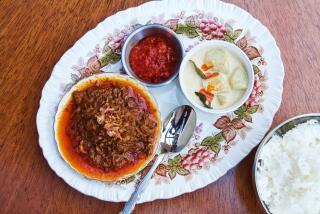Sweet, Pungent Flavors of Indonesia Captured
- Share via
Indonesia may be the world’s fifth largest country, but its cuisine is not well known abroad. Apart from the Dutch, onetime colonial masters of the vast Indonesian archipelago, Westerners just don’t seem to crave this exotic cooking, distinctively perfumed with such ingredients as lemon grass, galangal root and coconut milk.
Restaurants like Asian Deli could change that. This Orange establishment serves surprisingly good food for its setting, which is best described as modest. The interior is little more than a few tables covered in pink oilcloth, about a dozen hardbacked chairs and a counter, which is where you order. (There is table service if you insist, but it’s faster to use the counter.)
A few batiks and ceremonial masks hang precipitously from the walls, but apart from them this could be any mom and pop cafe in the universe. Come casual, even to the point of dressing down. Indonesia is hot and humid; no one here will object if you choose to dine in a T-shirt.
Asian Deli has been around for several years, but the place was recently acquired by Jakarta native Fred de Groot, and food here has improved considerably of late.
De Groot’s kitchen is now being run by a wonderful chef from Java named Hapsa, who makes occasional forays out of her kitchen to see how guests are enjoying the food. I’ll wager she is rarely disappointed.
The best way to begin a meal is with the finger snacks popular throughout Indonesia. Lumpia , for instance--Indonesian egg rolls, larger and meatier than their Chinese cousins, rounded out nicely by minced cabbage and bamboo shoots. Or kroket , and if that name sounds familiar, it’s because the name comes via Dutch from the French word croquette . An Indonesian kroket is a crisply fried cylinder of potato stuffed with dry shredded beef. The spicing, on the sweet, pungent side, has nothing European about it.
Lemper is another good appetizer--a warm cylinder of sticky rice with a filling, here shredded chicken loaded with coriander. Indonesians typically wrap lempers in plastic wrap and carry them around like sandwiches. The star appetizer is martabak , an egg-rich crepe with a filling of spiced ground beef. This restaurant rolls, stuffs and chops a martabak into eight delicious pieces, which are then topped with a cucumber peanut relish (they’re still to be eaten with the fingers) for a remarkably low $1.75.
*
Satay (also spelled sate) is meat grilled on tiny bamboo skewers, probably the best-known Indonesian street food.
At Asian Deli, the chicken satay comes coated in a sweet glaze, the pork satay has a tender crunch. Best of all, though, is sate udang Bali, skewered shrimp smothered in a turmeric-based sauce thickened with crushed candlenut, an Indonesian cousin of the macadamia with an indescribable flavor.
A good way to acquaint yourself with this cuisine is to order nasi rames , a mixed rice plate. Some of the foods on it are more heavily spiced than others, so it’s a good barometer for the rest of the menu. For this dish, white rice ( nasi ) is surrounded by a quintet of cooked foods: rendang , diced, dry spiced beef; telur sambal , a softly boiled egg coated with chili sauce; gado-gado , steamed mixed vegetables like tofu and bean sprouts in an unctuous peanut sauce; ayam goreng , yellow- colored barbecued chicken rich in spices, and a mountain of tiny fried fish and fried peanuts.
Nasi goreng , the Indonesian version of fried rice, is another possibility. Hapsa cooks hers with barbecued pork and plenty of egg, making it ideal for breakfast and a perfect foil for sambal , the thick Indonesian chili sauce. Kwetiau are rice noodles fried and served with a variety of toppings or eaten in soup with duck meat or won ton.
Asian Deli does not serve rijsttafel , the traditional Indonesian rice table feast that can contain as many as 30 dishes. Instead, you can look for several dishes about as far from European influence as is possible to imagine. One such dish is called pempek , rubbery fish cakes not unlike Japanese kamaboko, which are sliced in half then stuffed with bits of fried egg.
Ikan bakar rica , which comes in a large glass bowl, is essentially a fish curry made with coconut milk. Ikan is the word for “fish” in Bahasa Indonesian (Indonesia’s official language). In this case, the fish employed is the bony, sweet tilapia, cut into chunks, skin still on. Try the curry spooned onto a mound of rice steamed in coconut milk; it’s wonderful.
Rendang is one more signature dish for fine Indonesian cooks. Almost every one of them makes a version of this dish, which is essentially dry meat that has been stewed in spiced coconut milk until all the liquid boils off and the meat is nearly liquid itself.
Hapsa’s rendang is terrific, the crumbly beef coming in chunks that you mash into rice with chili sauce. It’s possibly the most intense dish here, and definitely the one you remember.
Probably the least familiar class of Indonesian food is the sweets, which mostly seem to be squiggly things floating around in parfait glasses filled to the brim with ice, palm sugar and coconut milk. Es cendol is the one with tiny green bits of sago-flavored cornstarch. Es kacang is red beans and sweetened milk. You might enjoy these desserts on a hot day, but I won’t tell you they are a must. If you’ve just gotten hooked on this cuisine, there’s no point in rushing things.
Asian Deli is inexpensive. Appetizers and pastries are $1.25 to $5. Soups and noodles are $2 to $6.25. Indonesian dishes are $3.50 to $8. Drinks and desserts are $1.25 to $3.
* ASIAN DELI
* 320 E. Katella Ave., Orange.
* (714) 532-4588.
* Lunch and dinner Tuesday through Sunday, 11 a.m. to 9 p.m. Closed Mondays.
* All major cards accepted.
* Times Line 808-8463
To check an Orange County restaurant by name to see if The Times has reviewed it recently, call TimesLine and press *6170 For other weekly recommendations from Max Jacobson, press *6160
More to Read
Sign up for The Wild
We’ll help you find the best places to hike, bike and run, as well as the perfect silent spots for meditation and yoga.
You may occasionally receive promotional content from the Los Angeles Times.






